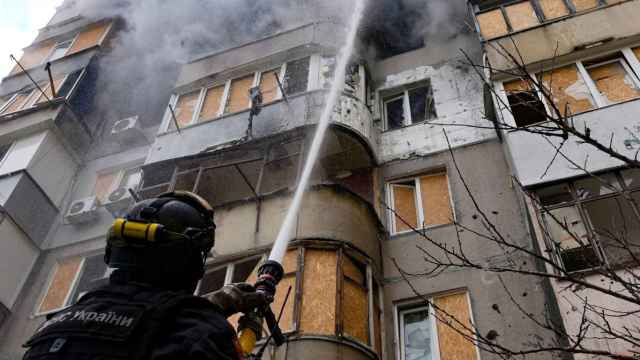 Yulia Latynina
Yulia LatyninaA woman, her young son and their dog were brutally murdered in St. Petersburg on May 11, and because the victims were relatives of friends of friends of President Vladimir Putin, the killer was found at once.
It turned out the murderer was a downstairs neighbor, a fourth-year cadet in a college run by the Interior Ministry. During his arrest, the cadet showed no remorse, explaining that when he entered the woman's apartment, her 12-year-old boy attacked him with a knife.
On April 22 in Belgorod, Sergei Pomazun shot six people in a store owned by his father. The assailant's relatives had repeatedly complained to the authorities that drug use had made him go completely insane, but the police never took any action.
The next day, a man stoned out of his mind stole a police car and crashed it at the entrance to a tunnel. The onboard camera captured the whole episode, and the video has swept the Russian Internet.
One week later, on May 1, another drugged-out man drove an SUV onto the Sheremetyevo airport runway. He was taken to a clinic for drug addicts and diagnosed with "acute psychosis."
Ten days later, Russian pop singer Vitas hit a bicyclist while driving his Infinity. Vitas refused to take a breathalyzer test, but judging from the video it looked like he was either drunk or high on drugs. The most shocking thing was that rather than apologize, Vitas and his producer attempted to prove that he was not even behind the wheel and that he was completely sober.
The press service for the Vkontakte social network site behaved similarly during the investigation into a shocking car accident involving a Mercedes in which Vkontakte founder Pavel Durov had previously been spotted. Following the accident, that vehicle left the accident scene and struck traffic police trying to stop it three times before reaching the Vkontakte offices. A guard quickly left the building and held up pursuing police long enough for the driver of the Mercedes to escape. To this day, the police have not yet determined who was behind the wheel.
The most disturbing part of the video is that the driver of the Mercedes is clearly either on drugs or else brazenly indifferent and convinced that the law cannot touch him.
Of course, people do crazy things all the time, and even people in their right minds are capable of behaving like animals. In the U.S., three young women were recently found who had been held captive in a man's home for the past 10 years without neighbors ever suspecting anything was wrong.
But something tells me that Russia is experiencing far more than the average number of bizarre, criminal incidents. There are several reasons for this.
First, there is a giant wave of drug use in Russia. The incidents with Pomazun and the man who stole and crashed the police car are clear examples of people doped out on drugs.
Second, the perpetrators are often immune to punishment. It's certainly good that police detained the police cadet who butchered the family of Putin's acquaintance, but can we be sure that the man had not killed anybody else before?
The third reason is that a certain percentage of people in any country are always bound to go crazy.
Yulia Latynina hosts a political talk show on Ekho Moskvy radio.
A Message from The Moscow Times:
Dear readers,
We are facing unprecedented challenges. Russia's Prosecutor General's Office has designated The Moscow Times as an "undesirable" organization, criminalizing our work and putting our staff at risk of prosecution. This follows our earlier unjust labeling as a "foreign agent."
These actions are direct attempts to silence independent journalism in Russia. The authorities claim our work "discredits the decisions of the Russian leadership." We see things differently: we strive to provide accurate, unbiased reporting on Russia.
We, the journalists of The Moscow Times, refuse to be silenced. But to continue our work, we need your help.
Your support, no matter how small, makes a world of difference. If you can, please support us monthly starting from just $2. It's quick to set up, and every contribution makes a significant impact.
By supporting The Moscow Times, you're defending open, independent journalism in the face of repression. Thank you for standing with us.
Remind me later.





